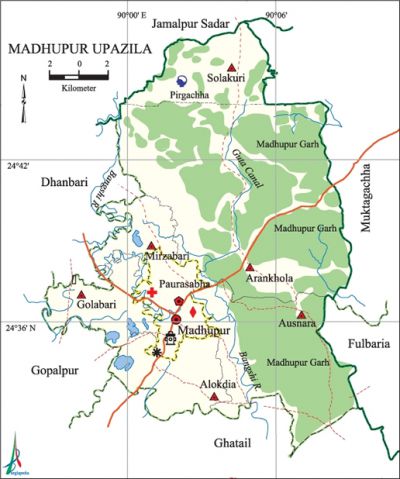Madhupur Upazila
Madhupur Upazila (tangail district) area 366.92 sq km, located in between 24°47' and 24°31' north latitudes and in between 90°10' and 89°57' east longitudes. It is bounded by muktagachha and jamalpur sadar upazilas on the north, gopalpur and ghatail upazilas on the south, fulbaria and Muktagachha upazilas on the east, dhanbari and Gopalpur upazilas on the west.
Population Total 296729; male 147734, female 148995; Muslim 271352, Hindu 11546, Buddhist 11, Christian 13600 and others 220. Indigenous communities such as garo and Koch belong to this upazila.
Water bodies Main river: bangshi; Guta Canal is notable.
Administration Madhupur Thana was formed in 1898 and it was turned into an upazila in 1983.
| Upazila | ||||||||
| Municipality | Union | Mouza | Village | Population | Density (per sq km) | Literacy rate (%) | ||
| Urban | Rural | Urban | Rural | |||||
| 1 | 6 | 111 | 180 | 64872 | 231857 | 809 | 44.7 (2001) | 37.5 |
| Municipality | ||||||||
| Area (sq km) |
Ward | Mahalla | Population | Density (per sq km) |
Literacy rate (%) | |||
| - | 9 | 23 | 56342 | - | 56.7 | |||
| Upazila Town | ||||
| Area (sq km) | Mouza | Population | Density (per sq km) | Literacy rate (%) |
| - | 1 | 8530 | - | 35.2 |
| Union | ||||
| Name of union and GO code | Area (acre) | Population | Literacy rate (%) | |
| Male | Female | |||
| Arankhola 24 | 29087 | 30192 | 29703 | 39.3 |
| Ausnara 28 | 17477 | 27755 | 29039 | 37.7 |
| Alokdia 21 | 7346 | 17162 | 17426 | 37.3 |
| Golabari 66 | 6553 | 16354 | 17007 | 38.7 |
| Mirzabari 78 | 4656 | 11842 | 12436 | 35.5 |
| Solakuri 92 | 20248 | 15660 | 15811 | 33.9 |
Source Bangladesh Population Census 2001 and 2011, Bangladesh Bureau of Statistics.

War of Liberation In April 1971 an encounter was held between the freedom fighters and the Pak army in the upazila in which 5 Pak soldiers including a Captain were killed. Freedom fighters had another encounter with the Pak army in the upazila at Rangamatia.
For details: see মধুপুর উপজেলা, বাংলাদেশ মুক্তিযুদ্ধ জ্ঞানকোষ (Encyclopedia of Bangladesh War of Liberation), বাংলাদেশ এশিয়াটিক সোসাইটি, ঢাকা ২০২০, খণ্ড ৭।
Literacy rate and educational institutions Average literacy 41.2%; male 42.7%, female 39.7%. Educational institutions: college 5, vocational college 1, secondary school 30, primary school 54, community school 5, NGO school 1, madrasa 36. Noted educational institutions: Madhupur University College (1972), Madhupur Technical College (2004), Madhupur Shahid Smrity Higher Secondary School (1972), Rani Babhani High School (1939).
Newspapers and periodicals Daily: Progatir Alo, weekly: Madhupur Barta, fortnightly: Madhubani.
Cultural organisations Library 9, club 76, cinema hall 6, playground 29, dakbungalow 6, cultural organisation 1.
Tourist spots madhupur national park.
Main sources of income Agriculture 63%, non-agricultural labourer 2.14%, industry 0.53%, commerce 13.05%, transport and communication 1.21%, service 8.90%, construction 2.40%, religious service 0.22%, rent and remittance 0.70% and others 7.85%.
Ownership of agricultural land Landowner 64.40%, landless 35.22%; agricultural landowner: urban 55.19% and rural 66.57%.'
Main crops Paddy, wheat, jute, sugarcane, potato, cotton, ginger, turmeric, betel leaf, kasava, vegetables.
Extinct or nearly extinct crops Khesari, gram, local varieties of paddy.
Main fruits Mango, jackfruit, pineapple, papaya, litchi, olive.
Fisheries, dairies and poultries Poultry 200, nursery 11.
Communication facilities Pucca road 133 km, Semi-pucca road 22 km, mud road 565 km.
Extinct or nearly extinct traditional transport Palanquin.
Noted manufactories Silk mill, rice mill, flour mill, lathe and welding factory, saw mill, bakery, bidi factory.
Cottage industries Goldsmith, blacksmith, potteries, weaving, bamboo work, tailoring; apiculture by private initiative.
Noted hats, bazars and fairs Madhupur Hat, Jolchhatro Hat, Pirojpur Hat, Gangaier Hat, Garo Bazar, Moter Bazar, Gopal Angina Gosthajatra Mela, Solakuri Baishakhi Mela and Jaitatul Devta Mela.
Main exports Pineapple, jackfruit, silk, kasava, cotton, honey.
Access to electricity All the wards and unions of the upazila are under rural electrification net-work. However 37.9% of the dwelling households have access to electricity.
Natural resources Honey, herbal medicine, flax, incense.
Sources of drinking water Tube-well 95.0%, tap 0.4% and others 4.6%.
Sanitation 66.7% of dwelling households of the upazila use sanitary latrines and 26.5% of dwelling households use non-sanitary latrines; 6.8% of households do not have latrine facilities.
Health centres Upazila health complex 1, union health and family welfare centre 6, satellite clinic 6, charitable hospital 2, missionary hospital 1, leprosy hospital 1, maternity hospital 1, clinic 4, health care centre 1.
NGO activities Operationally important NGOs are caritas, World Vision, proshika, brac, asa, World Tourist Mission, Family and Child Welfare Centre. [Joinal Abedin]
References Bangladesh Population Census 2001 and 2011, Bangladesh Bureau of Statistics; Cultural survey report of Madhupur Upazila 2007.
